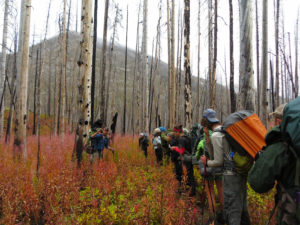“Alright guys, you need to make sure you have everything on the packing list.” It was the first day of WRFI and we were in a Missoula parking lot, surrounded by the piles of stuff we’d need for the next two months. We had synthetic rain gear, plastic tents, chemicals to purify our water, and apples from Fiji for lunch time snacks. With these, we’d surely be ready to create our own environmental ethic in Montana’s wilderness. Right?
a Missoula parking lot, surrounded by the piles of stuff we’d need for the next two months. We had synthetic rain gear, plastic tents, chemicals to purify our water, and apples from Fiji for lunch time snacks. With these, we’d surely be ready to create our own environmental ethic in Montana’s wilderness. Right?
Quickly, the illusion we had of primitive backcountry life was buried underneath our piles of gear. We wondered if it was valid to go into the wilderness with all this stuff. How would dragging our plastic stuff into the mountains teach us anything about being environmental?
The wilderness helped us answer this question, teaching us that spending time in the wild land is critical to balancing our industrial lives and helps move us towards a better environmental relationship with the world.
We started our trip with a week-long hike in the Bob Marshall wilderness complex, a collection of preserved area in northwest Montana. On the second day of our hike, we struggled up a 1,000 foot climb, and wondered what the point of all this inconvenience was. We took a break on the hard path, dreaming about couches and bacon burgers to order. As the daydreaming passed, we began to understand that the inconvenience of wilderness served as the crucial balance to the convenience of modern life. In day to day front country life, it’s easy to forget both convenience and its cost – a cost that the environment often pays. There were many ways to make our climb easier- a road, metal staircases, trucks- but they would have marred the integrity of the mountain and its ecosystem. Yet, for all our new found appreciation of inconvenience, we still kept our boots on. Without them, we would have never finished the trek. We would never fully shed the convenience of our modern lives, but here in the wildness we could see it for what it was, and stay mindful of their cost.
Even though our gear was as far from being environmentally conscious as possible, we did only bring what we needed to survive. There was no room in our packs for external distractions. Instead, we spend our days open and vulnerable to the external world and each other. In only a week, we already feel like family, with inside jokes and favorite stories. And our environment feels closer and closer to home as we meet new community members every day. Even a simple swim in a mountain stream introduces us to new birds like the playful American Dipper. In the wilderness, you are surrounded by so many other manifestations of life, all with their own personalities and stories. They draw you out of your own head, reengaging you with the world. We can’t stay out in the wilderness forever, but we can hold on to the ability to look outside of ourselves as we return to modern life.
Our experience in the wilderness is a construct, supported and defined by our modern industrial lives. Still, spending time in the backcountry is key to balancing our lives. Reconnecting, if only for a moment, allows us to see and evaluate the forces working on our daily lives. By bringing back the spirit of the wilderness, we return to industrial society ready to help heal its relationship with the wild, hurting environment.
One Reply to “Nico Matallana & Chelsea Johnson: The Spirit of the Wilderness”
Comments are closed.
Great experience and time to reflect about the conflicts we’re faced with our way of life and the society we belong to.